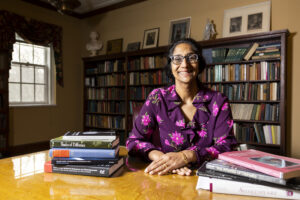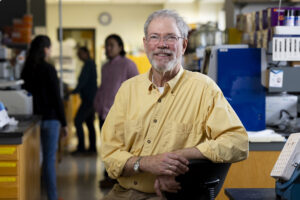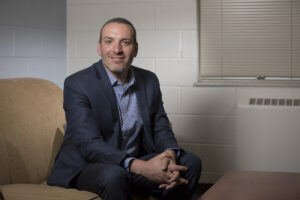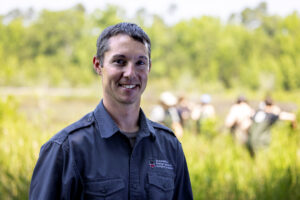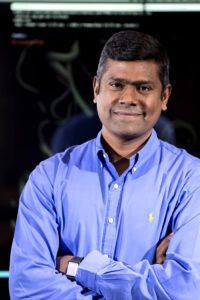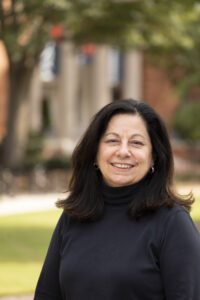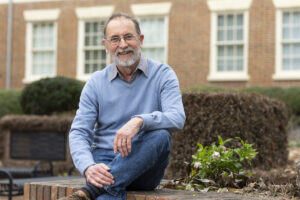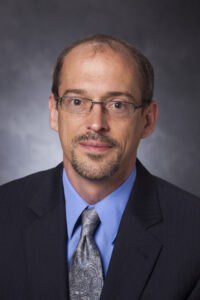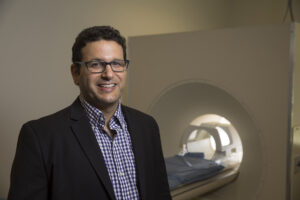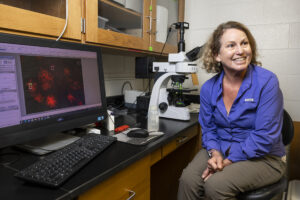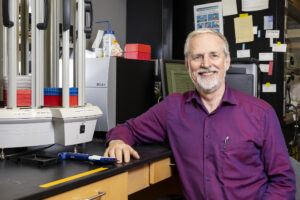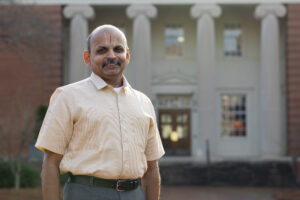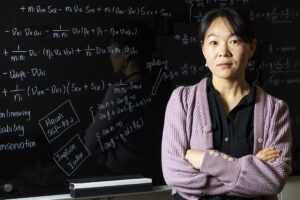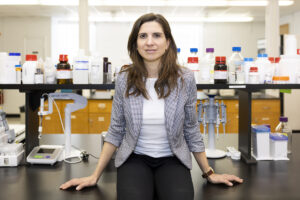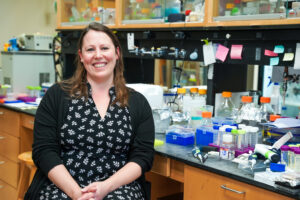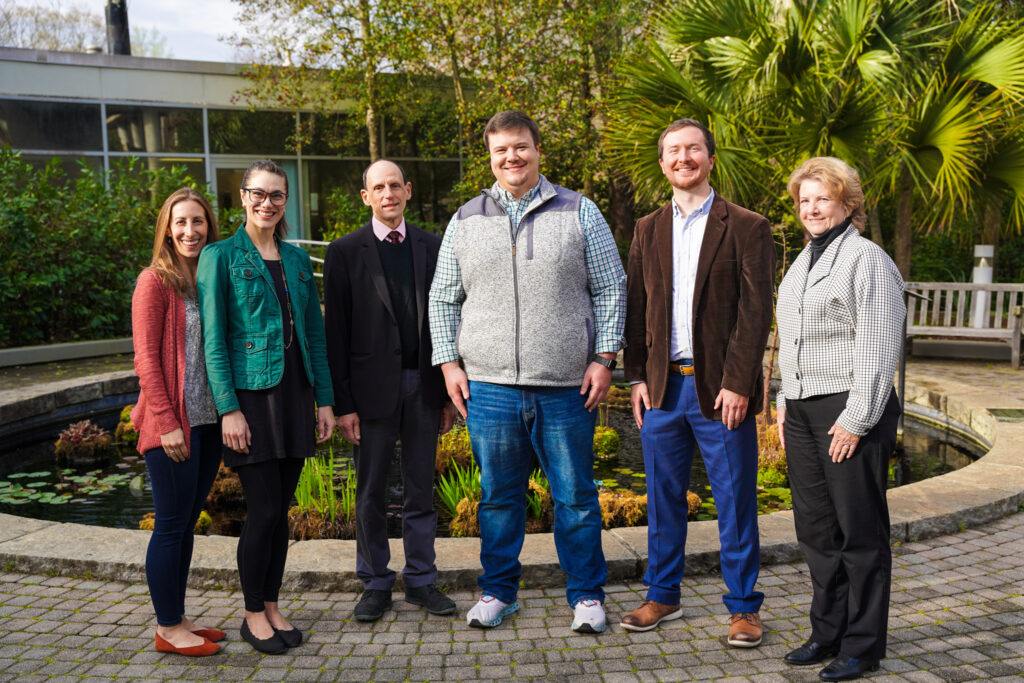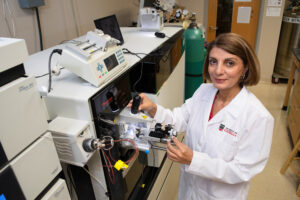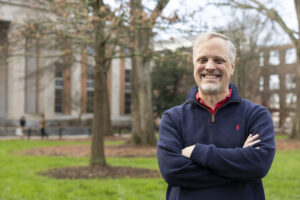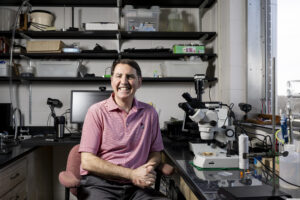Distinguished Research Professors
The title of Distinguished Research Professor recognizes senior faculty members who are internationally recognized for their innovative body of work and its transformational impact on the field. The Professorship is awarded to individuals working at the very top of their discipline, who are recognized as preeminent leaders in their fields of study.
• Sujata Iyengar, professor in the Department of English in the Franklin College of Arts and Sciences, is perhaps best known as the preeminent authority on Shakespearean appropriation, exploring how audiences engage with, undo or transform Shakespeare. Iyengar has published three single-authored books, “Shakespeare and Adaptation Theory” (2022), “Shakespeare’s Medical Language” (2011) and “Shades of Difference” (2005), which have transformed the study of Shakespeare and the British Renaissance. She is the founding co-editor of the digital peer-reviewed journal “Borrowers and Lenders: The Journal of Shakespeare and Appropriation.” She has co-authored seven books, producing collections of essays that have enabled and supported communities of practice.
• Christopher West, professor in the Department of Biochemistry and Molecular Biology in the Franklin College of Arts and Sciences, belongs to a small group of internationally recognized parasite glycobiologists. His research explores cellular processes involving various structures, enzymes and roles of glycans, or sugar chains. His studies have identified cell-to-cell mechanisms of environmental sensing and signaling in glycobiology. Some of his discoveries involve the biosynthesis and roles of novel glycan molecules in the model organism Dictyostelium discoideum. One of his contributions has been to describe that organism’s biochemical response pathway to altered oxygen levels,
allowing it to respond to its environment’s available oxygen.
• Joshua D. Miller, professor in the Department of Psychology in the Franklin College of Arts and Sciences, is a researcher in the field of psychopathological impairment, specifically in personality disorders with a focus on narcissism and psychopathy. Among his accomplishments is demonstrating that personality disorders are “built” from the same components found in “normal” personality but represent problematic configurations because of their extremity and inflexibility. His research helped lay the groundwork for changes in “Diagnostic and Statistical Manual of Mental Disorders, fifth edition.” He has produced 325 peer-reviewed publications and book chapters, an edited text on narcissism and a re-edited handbook on the assessment and treatment of antagonism.
Creative Research Awards
These awards recognize established investigators whose overall scholarly body of work has had a major impact on the field of study and has established the investigator’s international reputation as a leader in the field.
• James C. Beasley, Terrell Professor of Forestry and Natural Resources in the Savannah River Ecology Laboratory and Terrell Professor in the Warnell School of Forestry and Natural Resources, has developed a research program in wildlife ecology and conservation. His approaches to the study of radioactive contamination in the environment and its effects as an ecological stressor have challenged assumptions about the status and health of wildlife in radiologically contaminated landscapes, leading to the discovery of abundant and diverse wildlife communities. Since 2014, he has served as the International Atomic Energy Agency’s wildlife adviser to the Fukushima Prefecture government in Japan in response to the 2011 tsunami and nuclear accident.
• Natarajan Kannan, professor in the Franklin College of Arts and Sciences’ Department of Biochemistry and Molecular Biology and the Institute of Bioinformatics, leads a program at the interface of bioinformatics and biochemistry. Developing and applying statistical and computational tools, he maps the relationships connecting sequence, structure, function and regulation in large families of protein kinases. These enzymes turn signals on and off in cells, a critical part of cell communication. Kinases are involved in many diseases and in related drug development studies as anti-cancer and infectious disease targets. He has also developed powerful informatics tools and deep learning models for the classification and analysis of glycosyltransferases, a large family of enzymes.
• Karen Norris, professor in the College of Veterinary Medicine and Charles H. Wheatley Georgia Research Alliance Chair in Immunology & Translational Biomedical Research, is a leader in the fields of immunology, infectious diseases and cardiopulmonary diseases associated with long-term HIV infection. She has expanded her research in a series of innovative, well-funded and transformative programs. Her laboratory has developed a broadly protective vaccine and immunotherapeutic agents to prevent and treat life-threatening fungal infections, including pulmonary aspergillosis and invasive candidiasis. She holds patents for related technologies, and her work has led to the establishment of NXT Biologics, Inc.
• Jed Rasula is Helen S. Lanier Distinguished Professor of English in the Franklin College of Arts and Sciences. He is a scholar of modernism across the arts and is also widely known as a jazz historian. His research has been recognized with the prestigious Matei Calinsecu Award from the Modern Language Association for “History of a Shiver: The Sublime Impudence of Modernism.” He has authored 10 scholarly books, two large anthologies, three poetry collections, and more than 150 articles in books and journals.
• Bradley Wright, professor and head of the Department of Public Administration and Policy in the School of Public and International Affairs, has built a body of research addressing how work environments in government affect public employee attitudes and behaviors. His research is highly regarded for expanding the understanding of human motivation in public sector settings. Wright has united different streams of knowledge into a coherent whole, raising his profile as a scientist who explores new ways to study topics in his field.
Creative Research Medals
The university established the Creative Research Medals in 1980 to recognize a distinct and exceptional research or creative project, performed by a mid-career faculty member, with extraordinary impact and significance to the field of study.
• Assaf Oshri, associate professor in the Department of Human Development and Family Science in the College of Family and Consumer Sciences, researches the biopsychosocial mechanisms of resilience and risky behavior in children exposed to adversity. In more than 100 peer-reviewed articles, he seeks to understand how children and adolescents respond to different rearing environments, the developmental pathways toward and away from addiction and the emergence of resilience in youth. His research team has collected developmental, psychological, psychophysiological and brain imaging data for a longitudinal cohort study on more than 300 children, youth and their parents. His work has shown that children’s emotional regulation, their ability to modulate an emotion or set of emotions, is at the core of resilience to adversity. He has contributed knowledge and insights into the mechanisms of how chronic stressors (child maltreatment, poverty) become biologically embedded in the body’s reactions and make children and adolescents more vulnerable to engaging in risky behaviors that threaten their health and well-being.
• Thirty years ago, eagles were found to be dying of a mysterious disease in the southeastern U.S. Susan Wilde, associate professor of aquatic science in the Warnell School of Forestry and Natural Resources, led a team to investigate. Eventually they found a clue: invasive aquatic plants called hydrilla, which are abundant in the human-made lakes and reservoirs where affected eagles and other waterfowl were discovered. Working with agencies and other universities, Wilde’s team discovered a novel cyanobacteria harbored by hydrilla that produces a neurotoxin, now known as aetokthonotoxin, which was responsible for the vacuolar myelinopathy affecting birds of prey. More recently, working with collaborators in Germany, the team connected the final puzzle pieces: exposure of the cyanobacteria to bromide resulted in production of the deadly neurotoxin. The resulting paper, published in “Science,” was awarded the AAAS Newcomb Cleveland Prize in 2022. Through this interdisciplinary, career-defining project, Wilde helped solve a medical mystery decades in the making.
• The research of Jin Ye, associate professor in the College of Engineering, focuses on the cyber-physical security of power electronics and electric drives with applications in smart grids, manufacturing systems and electric vehicles. She has been a major contributor in the Multilevel Cybersecurity for Photovoltaic Systems research project, which has already resulted in several high-impact scholarly contributions and technologies and highly competitive research funding such as a $3.6 million award from the U.S. Department of Energy (DOE) Solar Energy Technologies Office. For the DOE effort, Ye is leading a UGA team that collaborates with a consortium of partners from the public and private sectors to shore up the country’s power grid defenses. The goal is to design, develop and test a two-level cybersecurity software solution for the solar photovoltaic (PV) industry. Ye and her team aim to integrate several security monitoring technologies into one integrated toolbox to defend the PV system against a variety of cyber-attacks.
Inventor of the Year Award
Michael Hahn’s research on plant cell walls (PCWs) led to a development of a molecular toolkit for PCW characterization that addresses a critical need in PCW research. Hahn, a professor of plant biology, has used this toolkit to develop a comprehensive experimental approach that allows for simultaneous identification and quantification of carbohydrates present in PCWs—critical information for understanding cell wall biology and optimizing PCW utilization. Hahn’s innovative, monoclonal antibody-based approach is faster and more efficient than prior methods requiring complex, time-consuming chemical analyses. Advanced knowledge of PCW composition enables the design of sustainable and economically viable processes appropriate for use with a specific biomass. Hahn’s invention has been applied to numerous plants. He has developed and licensed more than 100 monoclonal antibodies, including to companies specializing in reagents for plant, algal and bioenergy research. More than 30 commercial products have been derived from his research.
Entrepreneur of the Year Award
Puliyur MohanKumar’s translational research, in collaboration with Sheba MohanKumar and Yen-Jun Chuang, led to five invention disclosures and multiple patent filings focused on nanoparticle technology use in clinical settings. A professor in the College of Veterinary Medicine, MohanKumar formed the company SG Endocrine Research with Sheba MohanKumar to pursue commercial development of this technology. Its lead product is a non-surgical spaying/neutering technology, dubbed “Gonads Be Gone,” that is administered intravenously and causes complete inactivation of the gonads in two weeks. After preclinical validation, the technology has proven 100% effective in studies done with male and female cats. The company is also developing nanoparticle-based technologies to facilitate non-invasive imaging of brain neurotransmitters, a prostate cancer therapy and other applications. SG Endocrine Research licensed the nanoparticle technology under the Georgia Startup License program.
Early Career Scholar Awards
Established by the UGA Research Foundation, these awards recognize junior faculty whose research, creative and scholarly achievements indicate a trajectory toward an exceptional, sustained research career and an imminent rise to international stature in their field of study.
• Nora C. Benedict, assistant professor of Spanish and digital humanities in the Franklin College of Arts and Sciences’ Romance language department, has attained prominence as a scholar of Latin American literature and culture while developing digital humanities research. Soon after arriving at UGA in 2019, she launched a digital humanities project to situate Latin American cultural production in an international context beyond the “southern cone” (Argentina, Chile, Uruguay). Her monograph, “Borges and the Literary Marketplace: How Editorial Practices Shaped Cosmopolitan Reading,” broadens understanding of Jorge Luis Borges. Her book delves deeper into his work in the publishing industry of Buenos Aires as a Spanish-language hub for print culture.
• Lin Mu, assistant professor in the Department of Mathematics in the Franklin College of Arts and Sciences, is a successful applied mathematician. She has published 77 research papers in journals of computational and applied mathematics with 2,273 Google citations and 1,254 MathSciNet citations. Mu’s research has shown both depth and breadth and already has had a profound impact, underpinning many models in sciences and engineering. She has made significant progress in several different areas of mathematics, including finite element methods, optimal control, a posteriori methods, multiscale modeling, domain decomposition methods, uncertainty quantification and model reduction methods.
• Emily Noble, assistant professor in the College of Family and Consumer Sciences, has made advances in research on eating behavior, focusing on the neurobiology of food consumption, impulsivity, working memory, gut microbiota and obesity. She studies the bidirectional nature of the neural control of food intake, providing insights into how nutritional factors affect brain functions, including impacts on specific neural circuits. In published studies, she has addressed how diets high in saturated fat and sugar affect neurocognitive functioning. Her research on obesity and cognitive dysfunction has become a focal point in evolving understanding of obesity’s causes and consequences.
• Breeanna “Bree” Urbanowicz, assistant professor in the Complex Carbohydrate Research Center and the Department of Biochemistry and Molecular Biology in the Franklin College of Arts and Sciences, has made contributions to plant cell wall research. Urbanowicz synthesizes innovative, cutting-edge theories of how plants grow and develop and employs state-of-the-art techniques to address her biological questions. She uses a unique combination of plant molecular biology and biochemical analytical techniques, providing fundamental information on cell wall structure and synthesis. Studies from her lab have recently been published in major journals in her field.
Team Impact Award
Established by the UGA Research Foundation, these awards recognize junior faculty whose research, creative and scholarly achievements indicate a trajectory toward an exceptional, sustained research career and an imminent rise to international stature in their field of study.
The UGA Cognitive Aging Research and Education (CARE) Team is tackling one of the most debilitating public health problems faced by Georgians: Alzheimer’s disease. CARE is a clinical, research and outreach program delivering brain health education, improving access to diagnosis, conducting cutting-edge research and providing support for families affected by dementia. Inside the CARE hub, the team has already provided diagnosis and post-diagnosis support to more than 100 local families and counting. Outside the hub, the CARE team serves 11 geographically, racially, ethnically and economically diverse rural communities. CARE begins by learning about community needs from local stakeholders affected by dementias. Then, the team translates what it learns into a tailored action plan that guides CARE’s work in creating a dementia-informed community, removing barriers to accessing a diagnosis and providing support to caregivers. Finally, the CARE team works with each community to achieve the goals in its unique action plan and studies the impact.
Non-Tenure Track Faculty Research Excellence Awards
• Parastoo Azadi is the associate director of the Complex Carbohydrate Research Center for service and training, as well as a senior research scientist and globally recognized expert in the field of glycoscience. With a rare breadth of expertise, she guides analyses of microbial, viral, plant and animal glycans, helping drive progress in glycobiology in academia and industry. For nearly three decades, Azadi has directed the world’s leading center for glyco-analytics techniques, the CCRC’s Analytical Services and Training Laboratory. She’s led multi-million-dollar efforts to develop improved tools for glyco-analytics, co-authored more than 200 peer-reviewed manuscripts, and is principal investigator for the CCRC’s Department of Energy-funded Center for Plant and Microbial Complex Carbohydrates. At the onset of the pandemic in 2020, hers was among the first groups in the world to report on the sugar chain structure on SARS-CoV-2’s spike glycoprotein and later studied glycosylation differences in the five SARS-CoV-2 variants, including the highly transmissible Delta and Omicron strains.
• Earl “Bud” Cooper, clinical professor in the Department of Kinesiology in the Mary Frances Early College of Education, is a world leader in optimizing heat safety and sports through research, education and advocacy. He has demonstrated consistent research excellence since his arrival at UGA in 2008, successfully competing for extramural funding and publishing foundational studies on heat hazards for collegiate and high school athletes. The critical importance of work is best captured by the fact that Cooper has saved the lives of young athletes in Georgia and elsewhere. He led a six-year study that resulted in changing practice policies for high schools in Georgia in 2012, reducing potentially life-threatening heat illnesses by up to 60%. His research on modifying exercise based on WBGT (Wet Bulb Globe Temperature) metric has made Georgia the leader in this safety measure. Cooper’s research has been cited as critical evidence in guiding effective hot-weather sports participation policies in several states around the country and is cited in numerous national consensus statements.
• Robert L. Foster, senior lecturer in the Department of Religion in the Franklin College of Arts and Sciences, has received excellent reviews from major figures in his field for his innovative 2019 book, “We Have Heard, O LORD: An Introduction to the Theology of the Psalter,” published by Lexington/Rowman & Littlefield. It is one of only a few books in the last two centuries to explore various portraits of God within the 150 psalms of the Book of Psalms in the Hebrew Bible. Analyzing the original Hebrew text, Foster focuses on different psalmists’ rhetorical strategies, offering close, linear (canonical) readings with ultimate attention devoted to the divine subject. He shows how psalmists portray God’s character and God’s actions to persuade their respective audiences, whether that audience is human (preaching) or divine (prayer). Reviewers have especially praised the book for its readable style and accessible format, allowing Foster to communicate his ideas to both academic and non-academic readers.
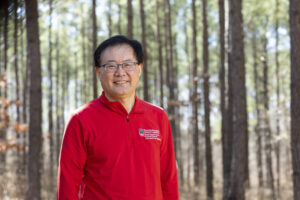
Environmental portrait of Senior Research Scientist and Graduate Faculty Dr. Dehai Zhao among loblolly pine trees in Whitehall Forest.
• Dehai Zhao, senior research scientist at the Warnell School of Forestry and Natural Resources, is among the top quantitative forest scientists in the world. A leader in forest biometrics, he focuses primarily on issues of tree growth and yield in intensive southern pine plantations. But his work covers a wide range of topics and approaches, including analyzing long-term experiments, assessing foundational biological and silvicultural concepts, and exploring and developing the frontiers of forest biometrics. Zhao has also served as a longtime associate editor for Forest Science, the premier global journal in his discipline. As he moves his research specialist’s discipline forward, he has produced a steady stream of more applied studies to address stakeholder questions and problems, helping improve silvicultural and management practices of southern pine and mixed-species forests. His strong record of externally funded research, scholarly publication and collaborative skills have influenced how millions of acres of forestland are managed.
Research Communications Award
Andrew K. Davis, an animal ecologist and assistant research scientist in the Odum School of Ecology, is passionate about promoting science to broader audiences and helping improve scientific understanding. In 2022, he and his research partners gained local, national and international attention from major media outlets for two peer-reviewed articles. Davis and an undergraduate co-author published a paper describing how the physiology of the now-famous Joro spider, an invasive species in Georgia, predicts its likely spread throughout the U.S. With members of the Department of Entomology, he also co-authored a paper about the monarch butterfly to understand how its breeding populations have changed over two decades. Davis is tireless in his efforts to work proactively with UGA communications professionals and in fostering relationships with journalists at prominent media outlets. As a result, his research projects have been featured widely in television, newspaper, radio and online news organizations, generating invaluable positive publicity for UGA and the Odum School.


